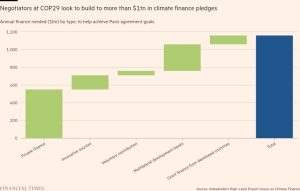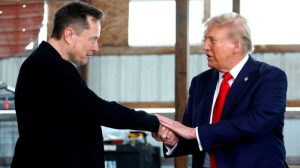Why the US can’t impose its will over global trade in electric cars
Unlock the Editor’s Digest for free
Roula Khalaf, Editor of the FT, selects her favourite stories in this weekly newsletter.
The global battle for electric vehicle supremacy has entered a new and excitingly combative phase. Last week, the US proposed a broad ban on Chinese software being used in any EV sold in the US. This Friday, after a fierce lobbying battle, EU member states vote on imposing anti-subsidy tariffs on EV imports from China.
Superficially, it looks like the rich economies collectively sticking up trade barriers against competition from China. In practice, the tactics are very different, with the Europeans integrating with the Chinese industry while the Americans decouple. As with much of its geostrategic policy towards Beijing, Washington wants its more China-sceptical model adopted by allies. But the US has failed to do the economic groundwork at home to give it overwhelming leverage.
Chinese EV supremacy is extraordinary in size — China makes and owns more than half the world’s electric cars, including plug-in hybrids — but also, unlike earlier generations of consumer goods (electronics, clothes), Chinese brands dominate the market. What this owes to decades of state subsidy is debatable. What is not is that the Chinese companies emerging from the cut-throat (and oversupplied) domestic market are ferociously globally competitive in their own right, as indeed are the foreign ones that increasingly export from their Chinese bases. And Chinese brands are in the lead in developing software to enhance their vehicles’ performance.


Even the European Commission and those EU governments that support the anti-subsidy tariffs only expect a temporary breathing space for European companies to adjust and develop. The companies themselves, mindful of their tenuous footholds in the Chinese market and needing to forge joint ventures in Europe, generally oppose the tariffs. And middle-income countries such as Turkey and Brazil wanting to increase domestic EV consumption are actively courting Chinese producers.
And even taking into account the protectionist motive, Joe Biden’s administration may well have a point about the security threats of EVs as “smartphones on wheels”, with manufacturers able to collect personal data and potentially control the cars remotely. But this is an unpropitious environment for the American sheriff to stick up “WANTED FOR DATA RUSTLING” posters around the place and try to run Chinese producers out of town.
The lure of US market access, via which Washington traditionally exerts control over other countries’ trade and tech policies, is weaker than it ought to be. American consumer preferences and the domination of the Detroit carmakers have left the US EV market pitifully under-developed. EVs in 2023 had a 10 per cent share of total sales compared with 38 per cent in China and 21 per cent in the EU, and even the EV tax credits in Biden’s Inflation Reduction Act have so far had only limited effect.
EV prices relative to traditional vehicles in the US market are higher than in China and the EU, and Washington has reduced competitive pressure by walling off its market to Chinese exporters with 100 per cent tariffs.
It’s a little like the tussle over 5G networks, where the US also has very strong views on whose kit its allies should shun (Huawei’s) but not much of a competitive American rival producer. Washington has only half succeeded with 5G, slowly getting restrictions implemented in the EU but not in many emerging markets. If anything, it’s in an even weaker position with cars.
Reliable US foreign policy allies such as Australia and the UK, which have dutifully excluded Huawei from 5G, are unlikely do the same for Chinese EV software. Australia, which let its own car industry die 40 years ago, is an enthusiastic importer of Chinese EVs. The UK, desperate to keep car production going after the Brexit shock, is actively courting Chinese foreign direct investment. Few British vehicles are more globally emblematic than London black cabs and double-decker buses: the cab’s hybrid version is already made by the Chinese carmaker Geely, and BYD is aiming to supersede the classic Routemaster bus with its new BD11 model.
As with US trade regulations in general, there’s a lot of leeway within the software rule for American regulators to exempt particular producers or types of system. As Michael Dunne of the Dunne Insights consultancy in San Diego points out, much auto software is open source, and it’s not clear who added which lines of code. “What even is ‘Chinese software’?” he asks. “How tightly can they define it?”
China also already has some non-negligible footholds in the US market that will have to be accommodated. BYD produces electric buses at a factory in California; Geely-owned Volvo has a plant making cars in South Carolina.
Strict implementation might simply force carmakers to create a separate North American supply chain with non-Chinese software. In that case, Dunne says, the global car market could divide in two: a high-priced low-tech island comprising the US and Canada and a cheaper, more digitally connected market for the rest of the world. (Mexico, which is part of the US-Canada trade bloc but also exports cars outside it, would probably straddle the two.)
It’s somewhat against the historical grain for US companies to be behind on technology and its households weak on consumption. But that’s where we’ve ended up with EVs. Without enough domestic production and ownership to give it overwhelming leverage, US trade and technology policy on EVs will struggle to have an impact on a global market that has rapidly developed without it.
#impose #global #trade #electric #cars





